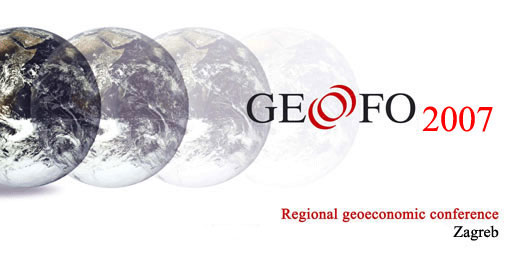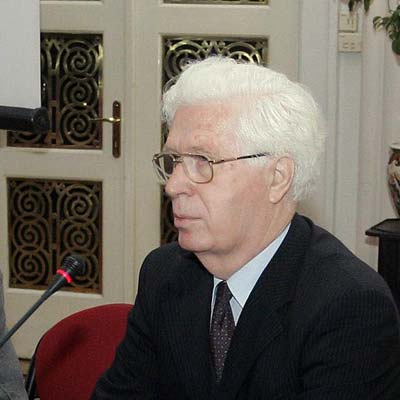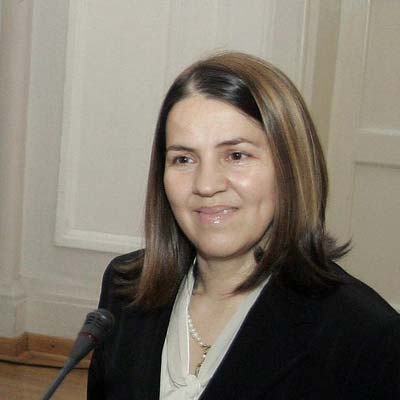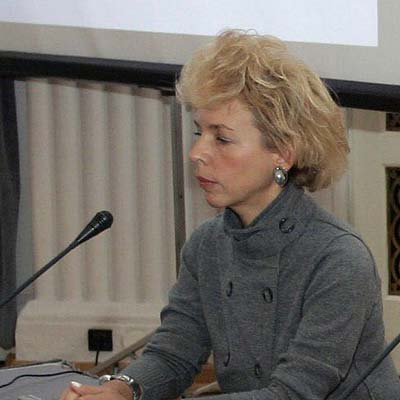ENERGY SECURITY BETWEEN MARKET REALITIES AND GEOPOLITCS
- Details

"Russia as a key player at global energy market"
GEOECONOMIC FORUM
THE CONFERENCE COMMITTEE OF RECOMMENDATION
H.E. Stjepan Mesić, President of the Republic of Croatia
FOCUS
Today we can see the world is primarily concerned with two global issues global terrorism and energy security. The Geoeconomic forum 2007 was engaged by Russia's leading role in the field of energy security. The importance of Russia in global energy context from EU to Central Asia to Iran has never been bigger. When Russia has keenly turned to market approach in the energy trading some countries have not accepted it as the logical market doings, but more like "old Russian geopolitics
To get these things better understood GEOFO invited Professor Elena Telegina who has a profound experience and practice in the field of energy policy of Russia.
Professor Telegina is the Executive Director of the Institute of Geopolitics and Energy Security of Russia. She is the author of 10 books and more than 100 articles on the issues of energy security, global energy projects, investments and finance in oil & gas industry including "Energy security and energy integration in the 21 st century: Asian profile." Telegina is the Head of the Department of Strategic Management of Fuel and Energy Complex (Faculty of Economics and Management) at Russian State University of Oil and Gas "I.M. Gubkin."
Professor Telegina is Member of the Board of LUKoil European Holdings, since 1999 Member of the Board of the Union of Oil Exporters of the Russian Federation. In 1998 she was Chairwoman of Board of Directors of Rosneft Oil Company.
In 1997-1999 she served as Deputy Minister of Fuel and Energy of the Russian Federation Professor Telegina was a Vice-Chairwoman of the European Energy Charter Conference in 1997- 1999.
WHY THIS CONFERENCE?
The state which plans its future prepares itself for an escalation of energy security problems induced by the geopolitical situation in the Middle East, and economic development of new economies, and lack of the processing world oil capacities.
The geopolitical tensions and competition over energy resources and an influence on global oil and gas market, and behaviour of some EU member states send a message to Croatia the national interest comes before the EU interest or " interest of the world".
The new energy alliances between Germany and Russia or Russia and Italy are the part of a contest for national energy interests, which have primacy over the common interest of European Union. The energy politics is continuing to be the matter of national decision-making and bigger EU countries are not ready to renounce its sovereignty in the field of energy sector.
EXCERPTS FROM INTRODUCTIONAL SPEECH OF ZVONIMIR BALETIĆ,
The President of the GEOFO
Croatia has opportunities to be an important
world Oil and Gas crossroad

The President of Geoeconomic Forum, Academician Zvonimir Baletić thanked to Professor Telegina for her coming in Croatia underlining that the topic of her lecture has become the main content of current foreign policy relations among states.
-Today's agenda is essential for Croatia because of its intention to raise its importance in the world oil routes and to take advantage of its oil and gas infrastructures in mayor pipeline projects. Croatia is very much interested to know not only what will happen with oil and gas sector in the future, but also what kind of (geo) politics will follow it.
Croatia has great potential in the oil field from production and processing to distribution of oil, but what the most important for Croatia is that some oil routes run through it. In respect of this there are a few dilemmas with whom to cooperate and in what ways. I think that in resolving these dilemmas Croatia should not behave one sided it should be open for different options having always in mind its aims and interests.
Croatia belongs geostrategically to the East Mediterranean
The oil issues have existed for many years in the area of East Mediterranean Sea, Central Asia, and Caspian Region and Black Sea basin.
Croatia 's geographic location makes it as an important zone in the geopolitics and geoeconomics of oil. It is geostrategically situated in the area of East Mediterranean and because of this it could be seen as an energy bridge to West Europe. That position makes Croatia very sexy to the EU, The United States, and the Russian federation. In this context Croatia keenly works to be inform on how things will go in the field of mayor pipeline projects, especially from Russia' s aspect and its role in global energy security. -
Academician Baletic ended the speech that for him is also very interesting to know how oil shapes Russian development ant its political position in the world and Eurasian region.
EXCERPTS FROM INTRODUCTIONAL SPEECH OF JASNA PLEVNIK,
The Vice-President of GEOFO
It would be harmful for Croatia if the sale of energy sector turns out to a factor of economic non-patriotism and weakening of national interests

Dr Jasna Plevnik, Vice-President of Geoeconomic Forum recalled the first GEOFO 2004 with the guest speaker former Malaysian Prime Minister Mohammad Mahathir who warned that small countries like Croatia should be aware of the big power of financial global capitalism which can decrease the value of national resources overnight just to buy it afterwards at a lower price.
'Since the first forum until the present day the things have changed in the world of economic interdependence. Many theoreticians claim that globalisation can no longer explain the spirit of the present time while the front men of globalisation theory are being criticized for having turned the globalisation into the argument per se instead of explaining it as a phenomenon.
Today's the world is primarily concerned with two global issues: terrorism and fear of shortage of energy sources. Energy security is the key factor of foreign policy of the EU, the USA, Russia or China. The importance of Russia in global energy policy from Europe, Central Asia to Iran and China has never been bigger which is best seen in President Putin's visit to Teheran.
Whether Croatia has learnt anything from its negative experience of globalising?
Dr. Plevnik stressed that this conference, like previous ones organized by GEOFO, intends to initiate debates on the policies of protection of Croatia's national interest, this time in the area of energy security. The question arises as to whether Croatia has learnt anything from its negative experience of globalising the sale of its banks, telecommunications sector, hotels and agribusinesses. It would be harmful for Croatia if in the years to come the sale of energy sector turns out to be just another strong factor of economic non-patriotism and weakening of national interests especially in the wider context when Croatia's geographic position and further development of infrastructure for transport of petrol and gas makes it the second or third energy crossroad of significance to the EU, Russia and the USA. Croatia has been looking for its product for global market though it is within its grasp. Isn't the very Croatia that mythical "global product" in the new global energy context?
EXCERPTS FROM THE LECTURE OF
DR. Elena Telegina
The present prices of oil and gas might rise and
exceed US$120 or even US$ 200 per barrel

Dr Telegina stated that in the years and decades to come Russia and other countries would need billions of dollars for research into new sources and technology for exploitation of oil and gas that requires a new pricing policy.
-Hence, the present prices of oil and gas might rise and exceed US$120 or even US$ 200 per barrel. The main reason for the rising costs of research and exploitation is a declining access to energy sources since oil and gas reserves will gradually become scarce. Russia will, focus its research on the seabed below the North Pole.
The oil and gas forecast, according to the Professor, is optimistic because of Russia's huge reserves and the possibility of new energy sources.
-In this context, Russia needs US$ 1 billion a year for R&D in order to use present oil resources more efficiently.
The prices of energy sources will rise, especially in Europe
The prices of energy sources will rise, especially in Europe, because it has no sources of its own and no reserves. Russia will base its supply of oil and gas to this region on long-term agreements that are the only guarantor of energy security.
Prof. Telegina pointed out that due to increasing markets of China and India, and in global terms, there will be an incremental demand of natural gas till 2020. When it comes to LNG (liquefied natural gas), there is a huge disparity in its price on domestic and foreign markets (US$60 per 1,000 m3 on domestic and US$300 on foreign market).
Russia will maintain its influence on Gazprom company, Russia's leading producer and supplier of natural gas that will buy the portfolios of other companies as well. The biggest buyers of Russian gas are Germany (34.4%), Italy (22.1%) and Turkey (19.9).
As to Russia's internal energy balance with gas dominating with the share of 51.2%, it should change with the increasing share of cheaper coal, especially in industry.
The correction of prices according to market criteria
Dr Telegina mentioned that Russia supplies the domestic market and the former Soviet republics with subsidized gas. The correction of prices according to market criteria becomes a major political issue between Ukraine (consumption of 59 BCM) and Belarus (20. 5BCM) on the one side and Russia on the other.
Russia 's gas sector restructuring needs US$7-10 billion a year to ensure that production meets domestic and export needs since Russian economy is increasingly dependent on oil and gas.This includes a new pipeline structure.
Russia continues to play a central role in global energy supply
In conclusion, Prof. Telegina said that Russia had become the engine of Non-OPEC supply growth and would continue to play a central role in global energy supply and trade but huge investments are required.
Answering to one of the questions made by a local expert in energy issues, Prof. Telegina replied that other sectors in Russia also need major investments. Without a five-year development plan Russia's development will decrease. The money will be invested by priority criteria, in sectors with less competition.
GEOFO VOX

GEOFO, association for world economic development studies, specialized for the issues of economic globalisation in Croatia and South-East Europe expresses its orientation through the interconnection of interests of economy, diplomacy and national security. GEOFO advocates for the domination of economic function in foreign policy of the country, but its every conference considers important to encourage the kind of Croatian economic culture that gives the advantage to the social solidarity in relation to unlimited freedom of profit.

Dr. Jasna Plevnik, dr. Elena Telegina, prof.dr. Zvonimir Baletić